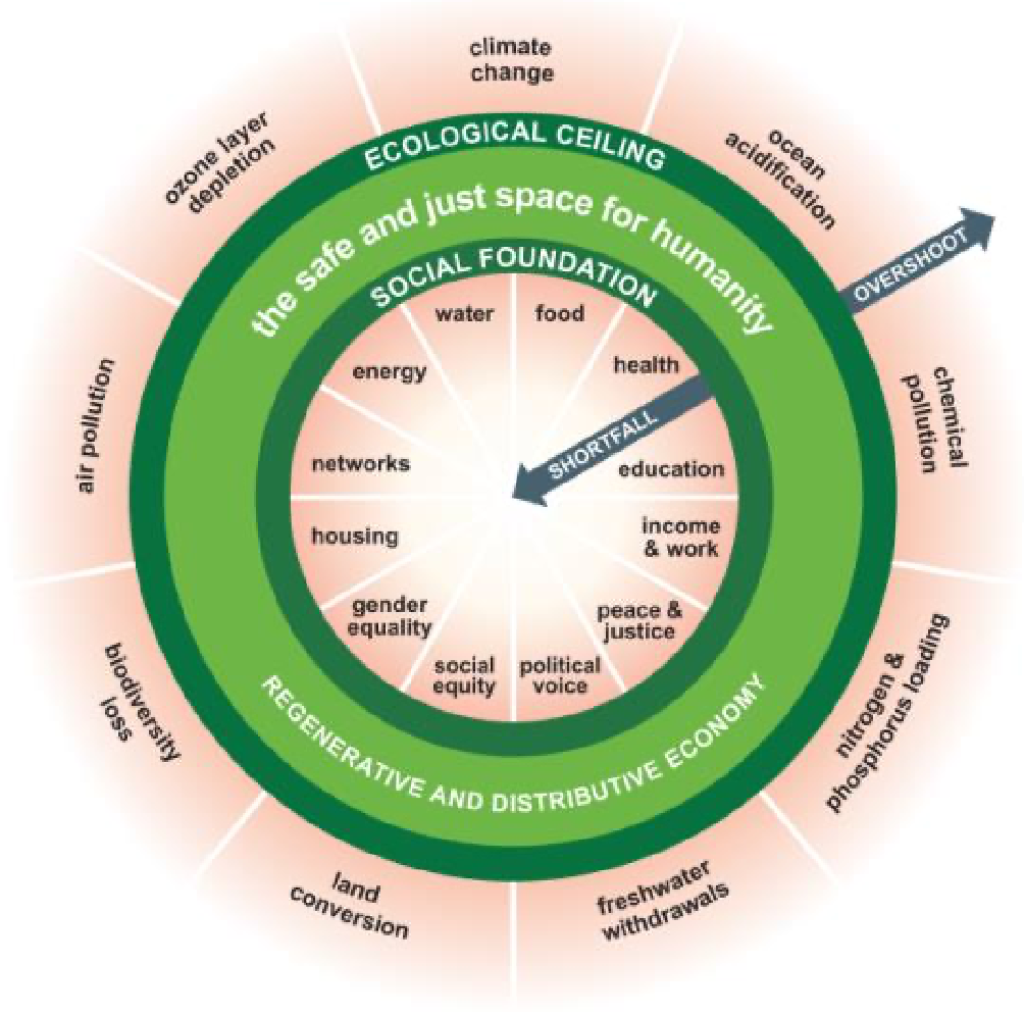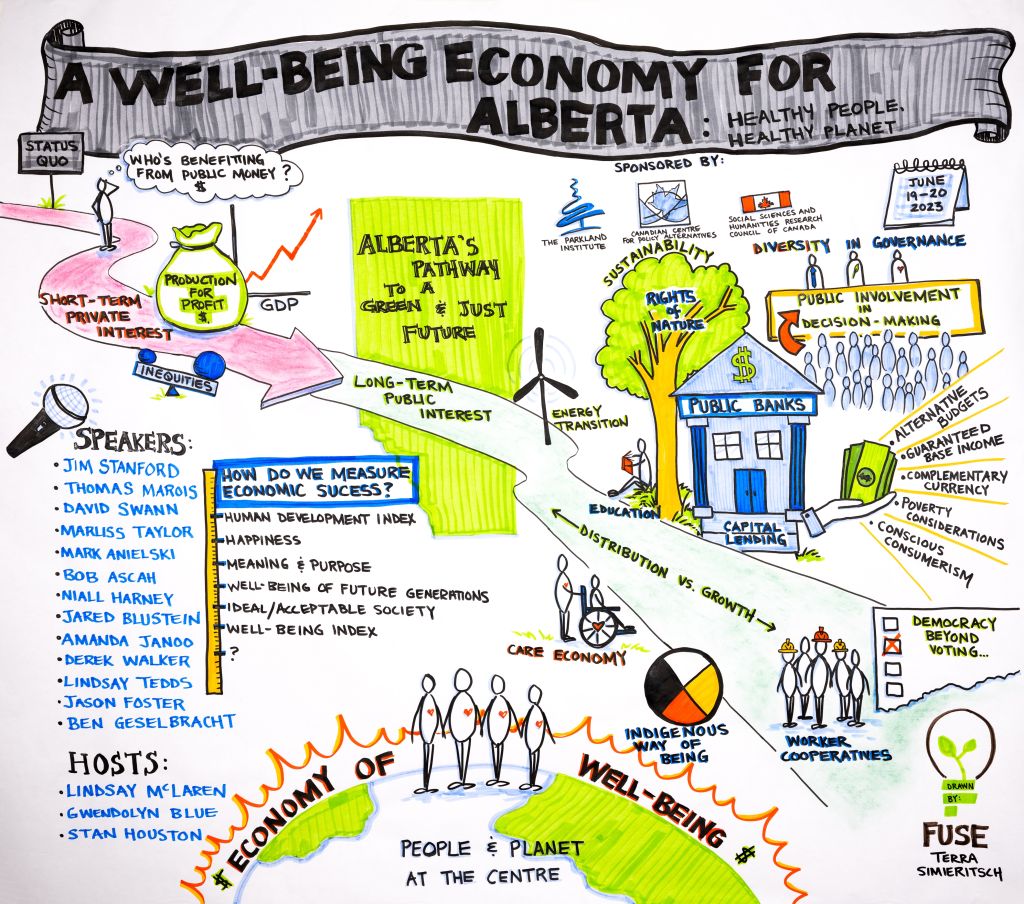The problems are obvious. Extreme weather events, including the worst wildfire season in Canada’s history in 2023, make it clear that human-caused climate catastrophe is no longer a distant prospect. Yet, our governments’ approach to phasing out fossil fuel dependency is slow and weak.
There are crises of affordable housing across the country, which should be unacceptable in a wealthy country like Canada, where housing is a human right. Our leaders, however, continue to allow and encourage housing as a financial asset rather than as a home.
Despite formal implementation of the United Nations Declaration on the Rights of Indigenous Peoples (UNDRIP), which is critical to a just society, federal and provincial governments persist in placing colonial authority ahead of inherent rights of Indigenous Peoples.
The list goes on.
Much public and political discourse focuses on these (and other) problems one at a time. A piecemeal approach aligns well with the siloed nature of (colonial) governments. However, it has considerable drawbacks: it leads to policy incoherence, where activities in one policy domain offset or undermine those in another.
One example is the rebate on fuel taxes offered by some provincial governments, intended to “help people” by offsetting the spike in consumer costs due to inflation and global conflict. However, the rebate reduced government revenue, which could have been used to augment public services. It didn’t support those using more active modes of transportation. And it effectively subsidized fossil fuel companies because the discount was, generally, not passed on to customers at the pump.
The problem of policy incoherence is compounded by the deeply embedded challenge of a short-term orientation in government, which underpins disproportionate attention and public spending on downstream activities like medical care, prisons, and clean up of environmental disasters, rather than an upstream approach to collectively providing the conditions for all people and our planet to be well in the first place.
At a certain point, it becomes important to look beyond the piecemeal approach and ask: how are these problems connected and what are the systems and structures that underlie all of them?
The answer has much to do with our current economic system of neoliberal capitalism. While capitalism has been the dominant global political economic system since the 17th century, neoliberal capitalism is a harsher version that emerged in the early 1980s and embodies a particularly aggressive pursuit of the capitalist vision of protecting and accumulating private wealth.
It does so through policies of deregulation (permitting companies to pursue profit in ways that are unencumbered by accountability for things like environmental stewardship); austerity and privatization of public services, which erodes their quality and viability; and trade liberalization, which promotes global diffusion of health-damaging products (e.g., ultra-processed foods) and processes such as growing precarity of labour markets.
Clearly, neoliberal capitalism does not promote the well-being of all people nor of the planet.
Contrary to neoclassical economic hegemony, economic growth under neoliberal capitalism does not “trickle down;” rather, most growth accrues to those who already have high levels of income and wealth while those at lower levels stagnate or actively decline. The ensuing inequality is toxic to societal well-being.
Moreover, under neoliberal capitalism, nature and intact ecosystems—which are essential to the well-being of our planet, on which we all depend—are not only not valued, they are actively destroyed as an acceptable side effect of a narrow vision of economic growth.
The system’s devotion to the myth of infinite growth is matched only by its equally untenable repertoire of fragmented, reductive, and technological “solutions” that leave harmful social and political structures untouched.
As progressive economists remind us, there is a well-orchestrated tendency to view “the economy” as fixed, natural (inevitable), and external to us. In contrast, history shows that neoliberal capitalism is “an” (not “the”) economy.
Moreover, far from a value-neutral and highly technical domain of experts, the economy is inherently social. We are all experts—perhaps especially those (human and non-human) whom our current system excludes.
The purpose of the economy is to meet societal needs: not only to survive but to thrive. If those needs are not being met, then the economy is not doing its job. Naming our economic system and calling out its very significant, but inherent, consequences is a key step in transformative change.
An alternative political economy vision
A well-being economy offers a potential alternative to neoliberal capitalism. While definitions and details may vary, the crux of a well-being economy is a guiding principle of ‘people and planet over profit’.
It draws theoretical anchoring from diverse intellectual and political traditions (e.g., Keynesian, Marxian, feminist, Indigenous, ecologist), which share in common a critique of the human and ecological consequences of conventional free-market economic policy prescriptions and support for cross-cutting progressive democratic structural change in the policies and institutions that currently govern the economy. The critical and heterodox nature provides key foundations for transformative change.
What constitutes “well-being” can be, and is, vigorously debated (indeed, there is a considerable risk of getting ‘stuck in the weeds’ of definitions and measurement). One heuristic that offers some basic contours is the doughnut economy (Figure 1), where the inner ring of the doughnut signifies the social foundations that everyone needs to be well (e.g., safe and affordable housing, nutritious and acceptable food, ability to live and participate in society with dignity and free from violence and discrimination) and the outer ring represents the ecological ceiling (e.g., levels of CO2 emissions, biodiversity loss, and pollution beyond which our way of living is not sustainable for future generations).
The doughnut itself represents a well-being economy and society. By identifying areas of shortfall (where social foundations are not met for everyone) and overshoot (where ecological ceilings are exceeded), the framework offers a tangible guide for governance and policy.

Several jurisdictions are working towards elements of a well-being economy vision.
New Zealand, for example, is working to align public spending with public and planetary well-being through a well-being budget.
Wales, as discussed by Houston et al. in this issue, legislates and empowers long-term thinking through its Wellbeing of Future Generations Act and Commissioner.
New Zealand and Wales, along with Finland, Iceland, and Scotland form the Wellbeing Economy Governments partnership (WEGo), which is a collaboration of governments interested in sharing expertise and transferable policy practice around well-being economies.
In Canada, the federal government in 2021 developed a Quality of Life framework, which aims to better incorporate quality of life measurements into government decision-making and budgeting.
These are important efforts which, in some cases (see Houston et al., this issue) have demonstrably benefited our publics and our ecosystems. However, we must keep in mind that the differences between our current political economic systems and the vision of a well-being economy are very significant. While the vision holds appeal, there are key questions that must be asked, in which a critical perspective around inequities of power is foregrounded.
A well-being economy: some hard questions and ways forward
Drawing from critical scholarship in the field of public health, a helpful heuristic for framing a critical discussion is “looking out” and “looking in.” Looking out refers to keeping one’s gaze focused on damaging social, political, and economic systems and structures that constitute the root causes of human and planetary suffering. Looking in is about inward reflection and humility around potentially harmful assumptions and blind spots of the well-being economy community and movement itself.
While a well-being economy represents a potentially transformative vision, it could alternatively be simply a new label that serves to maintain the status quo. Take Canada’s Quality of Life framework, for example. While the framework has important features, including explicit “beyond GDP” language and a holistic vision, its application is so far limited to measurement and budget impact statements. It is clear from the CCPA’s analysis of budget 2023 that the framework is not guiding policy in substantive ways towards human and planetary well-being.
As seen with other potentially transformative concepts, such as the social determinants of health, there is a distinct risk of well-being becoming a depoliticized policy framework that upholds the harmful capitalist vision.
One illustration is ‘green capitalism’, where a well-being economy is put forth as co-existing with economic growth, when, in fact, the two are almost certainly incompatible. More generally, ‘keeping the pressure on’ will entail being skeptical of any well-being economic vision that does not name and engage deeply with structures that perpetuate relations of power and exploitation, including capitalism, colonialism, white supremacy, patriarchy, and others.
A well-being economy involves displacing structures of oppression and unfair competition with ones anchored in care and reciprocity. It involves centering social and ecological goals and then considering what activities need to be expanded to reach them. It involves shifting basic human and planetary needs away from market influence and profit and into the public realm.
It requires new conversations and processes to rethink our collective values and shift discourses. As emphasized by the Wellbeing Economy Alliance’s work on changing the narrative: “We need new stories about what is possible. By changing the narrative, we can make a Wellbeing Economy common sense, the way the neoliberal economy is now.”
As a social movement, a well-being economy brings people together around a shared vision. A shared vision, however, brings potential for blind spots; thus, community self-reflection from a place of humility is necessary. To support looking in, guiding questions may include: Who is the well-being economy for? And, who gets to decide?
First, a well-being economy is sometimes described (including by us) as an economy for everyone. But who do we mean by everyone? Even initiatives that were applauded for their inclusivity have omissions. Canada’s post-WWII welfare state, despite threads of ‘universalism’, was, in many ways, anchored in an exclusionary ideal of white citizenship. More recently, Canada’s COVID-19 Canada Emergency Benefit (CERB) income support, while lauded for its broad and generous scope, focused on those with ties to the paid labour force, thus reinforcing the commodification that is built into neoliberal capitalism.
Admittedly, when placed in the broader context of neoliberal austerity and privatization, both CERB and post-war social welfare policies feel enviable. But we can do better. Asking ourselves, and responding honestly, to questions like “Who is everyone?” and “Who is a well-being economy for?” is an important place to start. This must include acknowledging the roots of well-being threaded throughout many Indigenous ways of knowing, and a deep commitment to decolonizing intersecting social movements by excavating the ways in which the dominant economic paradigms of the last three centuries have disproportionately harmed Black people, Indigenous Peoples, and other racialized people in Canada and elsewhere.
Second, while the well-being economy movement engages communities worldwide, it is predominantly driven by wealthy countries. But who are we—as members of wealthy countries—to push for a new global economic paradigm when other parts of the world continue to be left behind from the current one?
Indeed, it will not be easy to disrupt the entrenched dynamic of ‘rich countries calling the shots’. We can start by being explicit that a well-being economic vision itself represents a new ideology; by being transparent about its values (this is in significant contrast to the current system whose contours are largely and deliberately obscured by those seeking to maintain the status quo); and by working to ensure that processes align with those values.
For example, if we can agree that our social, economic, political, and climate crises are interconnected, and that a lack of democracy and participation lie at the root of those intersecting crises, then the only way forward is through radical participatory processes, where the processes themselves are key to building shared visions.
How different could our world look?
Our current political economic paradigm is predicated on harm, and suffering is necessary to sustain it.
It is empowering to realize that it does not have to be this way. We can come together to ask, what if, instead of greed, blame, and private material gains, we began from assumptions of solidarity, co-operation, participation, humility, and respect? How different would our world look?
A well-being economy offers a frame for reflecting on these “what if” questions, and a way to move beyond cynicism, hostility, and fear, to a place of hope. We warmly welcome you along for the ride.









